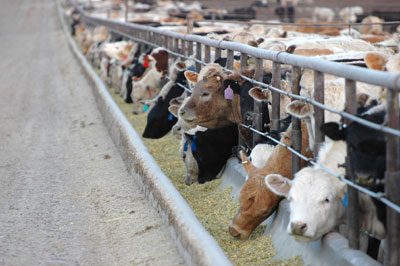FDA is prohibiting what are called “extralabel” or unapproved uses of cephalosporins in cattle, swine, chickens and turkeys.The new FDA order, which takes effect April 5, applies to off-label or unapproved use of cephalosporins in major food-producing animals.FDA says it’s taking the action to preserve the effectiveness of cephalosporin drugs for treating disease in humans.
January 6, 2012

USDA’s Food and Drug Administration (FDA) this week prohibited certain uses of cephalosporin antibiotics in animals. The move, FDA says, is aimed at preventing antibiotic resistance and preserving the drug's effectiveness for treating human diseases.
The new FDA order, which takes effect April 5, applies to off-label or unapproved use of cephalosporins in major food-producing animals: cattle, swine, chickens, and turkeys. Mike Apley, DVM and a professor in Kansas State University’s Department of Veterinary Clinical Sciences, as well as director of the PharmCATS Bioanalytical Laboratory, characterizes the change as “moderate.”
“For beef cattle, what it does is remove the ability to alter regimen but we can still use it for label application and other applications other than on the label when we meet the AMDUCA requirements, just as always. Basically what it does is stipulate that we can’t alter the dose regimen and we can’t use these products off label for the prevention of disease. We’re still trying to get our mind around what fits that definition. Does that include the use of Ceftiofur (marketed by Pfizer as Naxcel®, Excenel® and Excede®) following a surgery? That might be one place where we will have an alteration on use. In addition, the rule stipulates that we can’t use human cephalosporins in cattle production, which would be a rare occurrence in my opinion already,” he says.
In a release, FDA says it’s taking the action to preserve the effectiveness of cephalosporin drugs for treating disease in humans. Prohibiting these uses is intended to reduce the risk of cephalosporin resistance in certain bacterial pathogens.
Cephalosporins are commonly used in humans to treat pneumonia as well as to treat skin and soft tissue infections. In addition, they are used in the treatment of pelvic inflammatory disease, diabetic foot infections, and urinary tract infections. If cephalosporins aren’t effective in treating these diseases, doctors may have to use drugs that are not as effective or that have greater side effects, FDA says.
In its order, FDA is prohibiting what are called “extralabel” or unapproved uses of cephalosporins in cattle, swine, chickens and turkeys, the so-called major species of food-producing animals. Specifically, the prohibited uses include:
Using cephalosporin drugs at unapproved dose levels, frequencies, durations, or routes of administration;
Using cephalosporin drugs in cattle, swine, chickens or turkeys that are not approved for use in that species (e.g., cephalosporin drugs intended for humans or companion animals);
Using cephalosporin drugs for disease prevention.
In 2008, FDA issued and then revoked an order that prohibited extralabel uses of cephalosporins in food-producing animals with no exceptions. This week’s announcement, FDA says, responds to public comment and includes the following exceptions, which protect public health while considering animal health needs:
The order does not limit the use of cephapirin, an older cephalosporin drug that is not believed by FDA to contribute significantly to antimicrobial resistance.
Veterinarians will still be able to use or prescribe cephalosporins for limited extra-label use in cattle, swine, chickens or turkeys as long as they follow the dose, frequency, duration and route of administration that is on the label.
Veterinarians may also use or prescribe cephalosporins for extralabel uses in minor species of food-producing animals such as ducks or rabbits.
"We believe this is an imperative step in preserving the effectiveness of this class of important antimicrobials that takes into account the need to protect the health of both humans and animals," says Michael R. Taylor, deputy commissioner for foods.
The comment period is Jan. 6 to March 6. To comment on the order of prohibition, visit http://www.regulations.gov and enter FDA-2008-N-0326 in the keyword box. Following the comment period, the FDA will consider the comments prior to the order of prohibition going into effect on April 5, 2012.
For more info, read this FDA Q&A -- http://www.fda.gov/AnimalVeterinary/NewsEvents/CVMUpdates/ucm054434.htm.
The Federal Register notice is available by clicking here -- http://www.ofr.gov/OFRUpload/OFRData/2012-00035_PI.pdf.
About the Author(s)
You May Also Like



